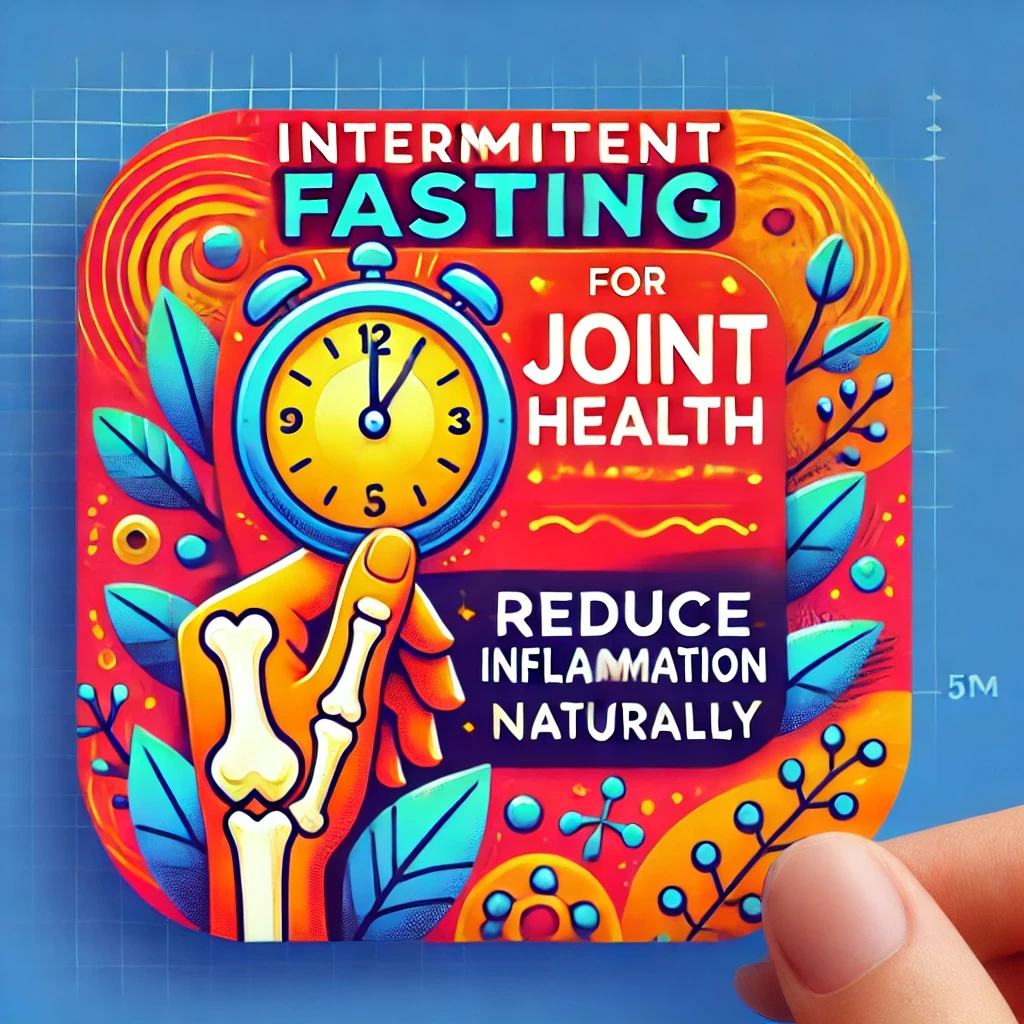
Table of Contents
Joint health is crucial for maintaining an active and fulfilling lifestyle. Unfortunately, many people struggle with joint pain and inflammation, which can severely limit their daily activities. Traditional treatments often focus on medication and physical therapy, but there’s growing interest in natural and holistic approaches. One such approach is intermittent fasting (IF), a dietary strategy that’s been making waves for its numerous health benefits. In this article, we’ll explore how intermittent fasting can impact joint health and why it might be a valuable tool in your wellness arsenal.
What Is Intermittent Fasting?
Intermittent fasting isn’t just another diet fad; it’s an eating pattern that alternates between periods of eating and fasting. There are several types of intermittent fasting schedules, including:
- 16/8 Method: Fasting for 16 hours and eating within an 8-hour window.
- 5:2 Diet: Eating normally for five days and restricting calorie intake to 500-600 calories on two non-consecutive days.
- Eat-Stop-Eat: Fasting for 24 hours once or twice a week.
Each method has its unique benefits, and the choice largely depends on personal preference and lifestyle.
Understanding Joint Health
Joints are the connections between bones that provide support and help you move. They’re made up of cartilage, synovial membrane, ligaments and tendons. Common joint issues include arthritis (inflammation of the joints), osteoarthritis (wear and tear of cartilage) and rheumatoid arthritis (an autoimmune disorder). These conditions can cause pain, stiffness, swelling and reduced range of motion, significantly affecting one’s quality of life.
How Intermittent Fasting Works
Intermittent fasting works by giving your body extended periods of rest from digesting food, allowing it to focus on other processes like cellular repair and reducing inflammation. During fasting, the body undergoes several changes:
- Cellular Repair: Increased autophagy, where cells remove damaged components.
- Hormonal Changes: Decreased insulin levels and increased human growth hormone.
- Reduced Inflammation: Lower levels of inflammatory markers.
These processes can contribute to improved joint health and reduced pain.
The Connection Between Diet and Joint Health
Diet plays a crucial role in joint health. Certain foods can exacerbate inflammation, while others can help reduce it. A diet high in sugar, refined carbs, and processed foods can lead to increased inflammation, whereas a diet rich in fruits, vegetables, lean proteins and healthy fats can support joint health. Intermittent fasting can help regulate dietary patterns and reduce the intake of inflammatory foods.
Research on Intermittent Fasting and Joint Health
Recent studies have explored the impact of intermittent fasting on joint health, with promising results. Research indicates that intermittent fasting can reduce markers of inflammation, improve joint function and even decrease pain in individuals with arthritis. These findings suggest that intermittent fasting could be a valuable addition to traditional joint health treatments.
Benefits of Intermittent Fasting for Joint Health
The benefits of intermittent fasting for joint health are multifaceted:
- Reduction in Inflammation: Lower levels of inflammatory cytokines can alleviate joint pain.
- Improvement in Mobility: Reduced stiffness and increased range of motion.
- Weight Loss: Decreased body weight reduces stress on joints, particularly weight-bearing ones like the knees and hips.
Specific Intermittent Fasting Protocols for Joint Health
Choosing the right intermittent fasting protocol is key to maximizing benefits for joint health. The 16/8 method is a popular choice due to its simplicity and ease of implementation. The 5:2 diet can also be effective for those who prefer more flexibility. It’s important to find a schedule that fits your lifestyle and can be maintained long-term.
Combining Intermittent Fasting with Other Treatments
Intermittent fasting can be used alongside traditional treatments for joint health, such as medication, physical therapy and exercise. It’s important to discuss with your healthcare provider before starting intermittent fasting, especially if you’re on medication or have underlying health conditions. They can help ensure that IF complements your current treatment plan without causing adverse interactions.
Potential Challenges and How to Overcome Them
While intermittent fasting offers numerous benefits, it can also present challenges, such as hunger, fatigue and difficulty sticking to the schedule. Here are some tips to overcome these challenges:
- Start Slowly: Gradually increase fasting periods to allow your body to adjust.
- Stay Hydrated: Drink plenty of water to stay hydrated and curb hunger.
- Plan Meals: Ensure meals are balanced and nutritious to keep you full and energized.
Success Stories and Testimonials
Many individuals have found success in improving their joint health through intermittent fasting. Case studies and personal testimonials highlight the potential of IF to reduce pain, improve mobility and enhance overall well-being. These stories can provide motivation and encouragement for those considering intermittent fasting.
Potential Side Effects and Precautions
Intermittent fasting is generally safe for most people, but it can cause side effects like headaches, dizziness and digestive issues. It’s important to listen to your body and consult with a healthcare provider before starting IF, especially if you have medical conditions like diabetes or are taking medications. Pregnant or breastfeeding women should avoid intermittent fasting.
Personalizing Intermittent Fasting for Joint Health
Intermittent fasting is not a one-size-fits-all approach. Factors such as age, diet, activity level and existing health conditions can influence how IF affects you. Tailoring your intermittent fasting schedule to your individual needs can help maximize benefits and ensure sustainability.
Lifestyle Changes to Support Joint Health
In addition to intermittent fasting, making other lifestyle changes can further support joint health. Regular exercise, maintaining a healthy weight, managing stress and avoiding smoking and excessive alcohol consumption can all contribute to reducing joint inflammation and improving overall joint function.
Conclusion
Intermittent fasting offers a promising approach to improving joint health by reducing inflammation, enhancing mobility and supporting overall well-being. While it may not be a cure-all, it can be a valuable tool in managing joint pain and improving quality of life. As with any dietary change, it’s important to consult with a healthcare provider and find a regimen that works best for your individual needs.
FAQs
Can intermittent fasting cure arthritis?
No, intermittent fasting cannot cure arthritis, but it can help manage symptoms and reduce inflammation.
How long does it take to see benefits from intermittent fasting?
It varies from person to person, but many people start to see benefits within a few weeks of regular intermittent fasting.
Can I exercise while doing intermittent fasting?
Yes, exercise can be combined with intermittent fasting. However, it’s important to listen to your body and adjust your activity level if needed.
Is intermittent fasting safe for everyone?
No, intermittent fasting may not be safe for everyone, particularly those with certain medical conditions or who are pregnant or breastfeeding. It’s important to consult with a healthcare provider before starting.
What should I eat during my eating windows?
Focus on nutrient-dense foods like fruits, vegetables, lean proteins and healthy fats. Avoid processed foods and excessive sugar.


